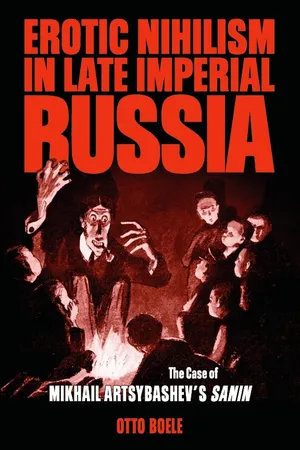
Erotic Nihilism in Late Imperial Russia
The Case of Mikhail Artsybashev's Sanin
- 255 pages
- English
- PDF
- Only available on web
About This Book
Banned shortly after its publication in 1907, the Russian novel Sanin scandalized readers with the sexual exploits of its eponymous hero. Wreaking havoc on the fictional town he visits in Mikhail Artsybashev's story, the character Sanin left an even deeper imprint on the psyche of the real-life Russian public. Soon "Saninism" became the buzzword for the perceived faults of the nation. Seen as promoting a wave of hedonistic, decadent behavior, the novel was suppressed for decades, leaving behind only the rumor of its supposedly epidemic effect on a vulnerable generation of youth.
Who were the Saninists, and what was their "teaching" all about? Delving into police reports, newspaper clippings, and amateur plays, Otto Boele finds that Russian youth were not at all swept away by the self-indulgent lifestyle of the novel's hero. In fact, Saninism was more smoke than fire—a figment of the public imagination triggered by anxieties about the revolution of 1905 and the twilight of the Russian empire. The reception of the novel, Boele shows, reflected much deeper worries caused by economic reforms, an increase in social mobility, and changing attitudes toward sexuality.
Showing how literary criticism interacts with the age-old medium of rumor, Erotic Nihilism in Late Imperial Russia offers a meticulous analysis of the scandal's coverage in the provincial press and the reactions of young people who appealed to their peers to resist the novel's nihilistic message. By examining the complex dialogue between readers and writers, children and parents, this study provides fascinating insights into Russian culture on the eve of World War I.
Frequently asked questions
Information
Table of contents
- Contents
- List of Illustrations
- Acknowledgments
- A Note on Transliteration, Translation, and Dates
- Introduction
- 1. From Onegin to Bazarov: The Canon of Epoch-making Heroes
- 2. Sanin: A Hero of Our Time?
- 3. Counterliterature: The Search for Poetic Justice
- 4. The Pornographic Roman à Thèse: Publication, Censorship, Ban
- 5. Sanin and Its Readers: A Bible for an Entire Generation?
- 6. Hard-core Saninism: The Case of the Free Love Leagues
- 7. Muscles for Money: Sanin as Ex-student
- Conclusion
- Appendix
- Notes
- Index